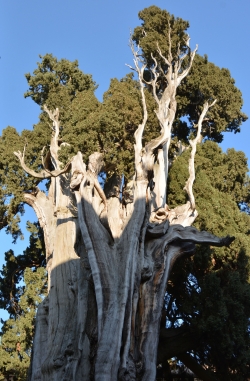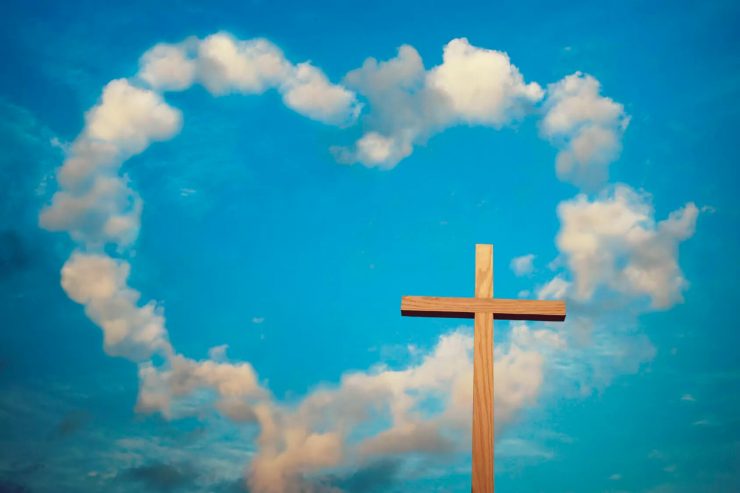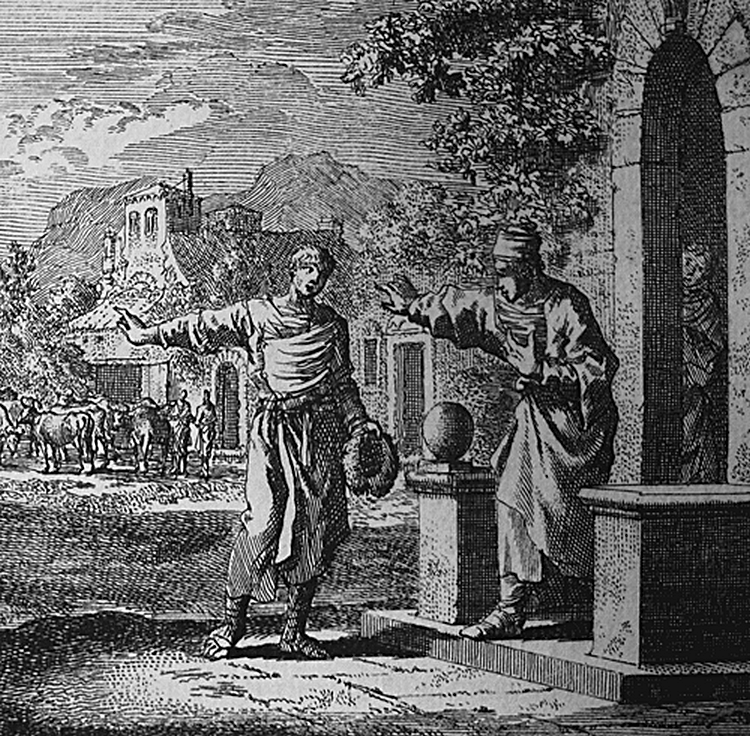Text: Mark 12:28-37
I think all of us would agree that idolatry is foolish. The idea of manmade gods is a ridiculous notion. The Lord, through Isaiah gives this illustration in chapter 44:
He cuts down cedars, or he chooses a cypress tree or an oak and lets it grow strong among the trees of the forest. He plants a cedar and the rain nourishes it. 15 Then it becomes fuel for a man. He takes a part of it and warms himself; he kindles a fire and bakes bread. Also he makes a god and worships it; he makes it an idol and falls down before it. 16 Half of it he burns in the fire. Over the half he eats meat; he roasts it and is satisfied. Also he warms himself and says, “Aha, I am warm, I have seen the fire!” 17 And the rest of it he makes into a god, his idol, and falls down to it and worships it. He prays to it and says, “Deliver me, for you are my god!” (Isaiah 44:14-17)

It’s a good thing we modern people are smarter than all that. God said not to make any graven image and bow down to it, and these days it seems pretty easy to avoid that, right? Or is it?
Martin Luther writes in the Large Catechism about the First Commandment, “You shall have no other gods before Me”:
“A god is that to which we look for all good and in which we find refuge in every time of need. To have a god is nothing else than to trust and believe him with our whole heart. As I have often said, the trust and faith of the heart alone make both God and an idol.
If your faith and trust are right, then your God is the true God. On the other hand, if your trust is false and wrong, then you have not the true God. For these two belong together, faith and God. That to which your heart clings and entrusts itself is, I say, really your God.” (Large Catechism, First Commandment 2-3)
Jesus responds, quoting Deuteronomy 6: “Hear, O Israel: The Lord our God, the Lord is one.” Originally, this was spoken to Israel as they came out of polytheistic Egypt. As Mark writes this Gospel for the Christians at Rome, they too are stepped in pantheism. There are gods for every aspect of life, and they weren’t shy at offering prayers to them. Even their Caesar claims to be a son of the gods.

We’re more sophisticated in the things we put our trust in. We don’t call them gods necessarily; but you can identify them by the way people talk about and react. Science will surely do us good, and studies have proven it to be true and effective. Equality is the noble virtue of our day and woe to the person who stands in its way. Inclusion is revered among many, but often applied contrary to Biblical teaching. Health and wellness is such a goal in life that we are willing to sink thousands, if not in some cases, millions of dollars, to achieve and extend the length and “quality of life” before we breathe our last.
Against this backdrop, we are called to confess, “The Lord our God, the Lord is one. 30 And you shall love the Lord your God with all your heart and with all your soul and with all your mind and with all your strength.”
The God we worship, who has claimed us, is an exclusive God. The gods of today are okay working together, and in fact, the more of them you embrace whole-heartedly, the smarter they say you’ll be. But the Lord your God is one Lord. You shall have no other gods before Him. Luther explains this by saying, “We should fear, love, and trust in God above all things.” (Small Catechism explanation) What does this mean?

– Fear – I acknowledge that there is only this one God. All other candidates are unacceptable. Fear does not mean if we misstep, we face His wrath, because we also believe in what He did on the cross where Christ bore the wrath of God and was truly forsaken (Matt. 27:45-46)

– Love – I give my whole being to God. There is no part way, and God is not just a pastime to be interested in when things aren’t hectic. He is the object of our devotion and because of Who He is and what He has done for us, we would gladly do what He tells us.

– Trust – This is because of God’s character. He is worthy of trust, because He keeps His Word: When He says He saves, He does (Matt. 1:23); when He says He is good and works all things—even evil things—for good, He does (Gen. 50:20). It is God’s trustworthiness that our heart clings to when our road is dark and we cannot see, in the night of terrible loss, in disaster, or in times of war.
So the Lord Jesus says, “You shall love the Lord your God with all your heart and with all your soul and with all your mind and with all your strength.”

– Heart – The total devotion of the individual to God. “God is not the only option, but He is the only possibility.” (David Scaer) Here our affections are tempted and drawn away by trust in those “other options” because they provide some level of security and good.

– Soul – The soul (psyche) is the part of us that has to do with the things of this world. To love God with all one’s soul is to do away with attachment to the things of this world and put God there. Moth, rust, thieves, and death may take everything else. He is the only One who will not fail you.

– Mind – This is your inner dialog, your reasoning. Your mind is what keeps you up at 3 A.M. worrying about what might happen or mulling over regrets and frustrations. It’s your mind that runs the narrative that decides how you will act, what you will say. But this is what the psalmist means when He says, “On His instruction he meditates day and night.” (Psalm 1:2)

– Strength (unique to Mark) – To love the Lord with all your strength means devoting your ability to the Lord—whether you are healthy and can help others with projects, older but still driving and giving rides, or homebound and able to pray for one another and if you can call or write. It is the strength God gives you, however small or great.
These things are so important that they are echoed by this scribe: “You are right, Teacher. You have truly said that he is one, and there is no other besides him. 33 And to love him with all the heart and with all the understanding and with all the strength, and to love one’s neighbor as oneself, is much more than all whole burnt offerings and sacrifices.” In response to this, Jesus tells this man that He is not far from the Kingdom of God. So close, in fact, that he is looking it in the face.
“How can the scribes say that the Christ is the son of David? 36 David himself, in the Holy Spirit, declared, “ ‘The Lord said to my Lord, “Sit at my right hand, until I put your enemies under your feet.” ’”
We do not meet this one, true God apart from the Man born of Mary. In Him, “the whole fullness of God dwells bodily” (Colossians 2:9). There is no other god and no other name under heaven by which men might be saved (Acts 4:12). We meet Him in His Word and in His risen Body hidden under bread and even in our neighbor. We are not meeting a mere man, we are meeting David’s Lord, our Creator and Savior.
This mystery that God has become Man and has humbled Himself as a Man to bear our burdens, to take our punishment, and to be killed while never ceasing to be God Almighty is the central reality of our Theology. The mystery of the Incarnation is inseparable from all other topics of theology or from any possible theological question. “All Theology is Christology” because there is no God but Christ. The Lord our God is One. His Name is Jesus for He saves His people.

And it is this one Lord, fully Man and fully God, who gives us His risen Body and Blood, which alone have the power to take away sin, strengthen us in our weakness, and give us a foretaste of the world to come. After we receive this, we usually pray, “We give thanks to You, almighty God, that You have refreshed us through this salutary gift, and we implore You that of Your mercy You would strengthen us through the same in faith toward You and in fervent love toward one another…”
And that brings us back to the Second great Commandment: “You shall love your neighbor as yourself.” We are a people who have been blessed with this knowledge of the one, true God, who created us, redeems us, and sanctifies us. But as can be seen in the world in which we live, how few people know this. They are the victims of pantheism, of the degrading practices with which men and women abuse each other and numb the pain.
Something that struck me in the presentations from Dr. Phil Brandt this past week on Christian evangelism in the first few centuries is how they saw the people around them as first of all human beings, created in God’s image. Having been enlightened by the Word of God, they could see in the accepted culture all kinds of idolatry, abuse, and no dignity for certain people.
Most of the time when we see the state of the world and society, it’s because we are comparing it to Christendom. We are outraged over witnessing the people of the world abandon the biblical ethics which endured for centuries. And yes, grieving the loss is natural, but we also need to move past that.
It doesn’t help that the Church is one of those “institutions” that society is rebelling against. In reprehension toward those whose morals fell short of Christian morals, the “Church” (meaning Christians) has protested, yelled, and used the condemnation of the Law to bring back these erring. But how can they return to what they were never taught?

The landscape of Christian witness, in western society today, is far different than when the LWML started in 1942. The truth of the Bible means virtually nothing, so if we were to quote what we regard as Sacred Scripture, they might find other Bible passages to throw back in our face and shout that we have no right to judge. Their authorities are their peers, the law of the land, and feelings.
When we are commanded to love our neighbor as ourselves, our Lord is teaching us to love them as human beings. See that person undergoing gender transition and try to discern what inner torture or abuse drove them to mutilate their body. When we see a young woman dressed in revealing clothing, to understand the sway of pornography that objectifies a woman’s body and the message she hears that she is only worthy if she can tease and please the opposite sex. When you see hillsides adorned with tent communities, consider the needs of those people for clean water and sanitation, and that many of them have untreated diseases of mind and body.
Then may the Church be the sanctuary to the lies and death in the world. Remember what the Lord our God who is one Lord has done and is doing: through the incarnation, suffering, death, resurrection, and ascension of Jesus, God has made His Church the outpost of the new creation in this dying world. The Kingdom of God is where the image of God is being restored, where loving your neighbor is not the flighty emotion, and where those who are poor in the world are made rich in faith and heirs of eternity [James 2:5].
We thank God this day, and every month when we collect our mites, for the ways that these funds are able to support grants to many outreaches here and around the world. We also thank the Lord our God, who puts His mission directly in our lives. And we pray that through our humble lives of loving the Lord our God with all our heart, soul, mind, and strength, and our neighbors as ourselves, that they too may rejoice in God’s Christ. Amen.




